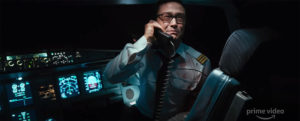7500, the code used for hijackings, takes the all-too-familiar tropes of a terrorist hijacking and reframes them with a harrowing story that unfolds in real time. By removing any hint of sensationalism from the events, filmmaker Patrick Vollrath focuses on the moment-to-moment uncertainty of people ripped in an instant from the security of their familiar routines, and then forced to face both impossible choices as well as their own mortality. And he does it within the confines of a cockpit.
Routine is the keyword as a flight prepares to leave Berlin for Paris. There are minor annoyances. Two passengers have not boarded, though their baggage has. Security concerns cause the plane’s captain (Carlo Kitzlinger) to delay take-off as the bags are removed. First Officer Tobias Ellis (Joseph Gordon-Levitt) finds out his 2-year-old son with flight attendant, Gökce (Aylin Tezel) didn’t gain admittance to their first choice in pre-schools. Nothing they can’t handle after a quick chat in the cockpit and an even quicker, and very chaste, smooch.
Vollrath takes us through the pre-flight checks, the ritual call and response between Captain and First Officer, pilots and ground control, as the plane takes off with only a warning about bad weather to keep the fasten seat-belt sign on in the passenger cabin. It’s only when a flight attendant returns to the cockpit that the trouble begins. When the door opens, hijackers, armed with a glass knives storm the cockpit with one gaining entry. The action is swift, with no dramatic music to tell us how to feel as the Captain and First Officer are stabbed before Tobias bludgeons the intruder into unconsciousness and relocks the door before the other two hijackers can enter.

Joseph Gordon-Levitt
From here, Tobias, whose wounded left arm leaves him marginally more able-bodied, is in charge. As the minutes tick by, he can only watch helplessly on a video monitor as one hijacker (Passar Hariky) threatens to kill passengers one by one if Tobias refuses to open the door. The other one translates the demands for Tobias, but while the translator (Omid Memar), is visibly shaken by what his accomplice is doing, it becomes clear that he is in no position to help.
This is a tour-de-force performance from Gordon-Levitt. Tobias’ physical and psychic pain when they erupt have a primal rawness that shocks the system, particularly when Tobias attempts to bargain with an implacable adversary who is willing not just to kill to in order to gain what he wants, but who is also willing to die for it. The hopelessness of the situation, coupled with the character’s frantic desperation, is perfectly, achingly realized.
Plot points that in other films would be the sustaining storyline are quickly dispensed with as the film progresses. If some of them are just a little too pat, Gordon-Levitt’s performance, and the twists that Vollrath judiciously injects, make them palatable, even forgivable, with direction in close quarters that is suitably claustrophobic while never quite being static.
The contrast between Tobias, an ordinary nice guy, and the sudden onslaught of violence he faces is as disconcerting as the violence itself, bespeaking as it does the random nature of said violence. The sound of the hijackers banging on the cockpit door, and the death it represents whether the door opens or not, becomes the delusion of security made manifest. It is the root of why 7500, set in a confined space and deliberately observational, is so counter-intuitively suspenseful. And all the more effective because of it.
Your Thoughts?